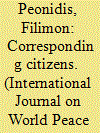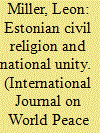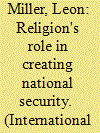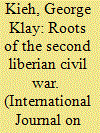| Srl | Item |
| 1 |
ID:
086752


|
|
|
|
|
| Publication |
2009.
|
| Summary/Abstract |
In this article, Filimon Peonidis is concerned with the problems of peace when strong nations or empires flex their muscles on the world stage much the way warlords do within states. He suggests one way to reduce the violence that results from the unilateral behavior of a powerful state towards a less powerful one is through the novel concept of "corresponding citizens." Such corresponding citizens would be elected by smaller countries, e.g. Greece, to serve within the governments of larger powers like the United States or Britain.
|
|
|
|
|
|
|
|
|
|
|
|
|
|
|
|
| 2 |
ID:
086758


|
|
|
|
|
| Publication |
2009.
|
| Summary/Abstract |
After the collapse of Soviet Union, Estonia took pride in becoming a model of progressive social, economic and political reform. Its accomplishments have been commendable given the fact of its enormous diversity challenge. This diversity challenge (that Estonia must effectively manage as a part of its adjustment to democracy) is largely due to massive population shifts that were a part of Soviet strategy.
|
|
|
|
|
|
|
|
|
|
|
|
|
|
|
|
| 3 |
ID:
086755


|
|
|
|
|
| Publication |
2009.
|
| Summary/Abstract |
The article by Alon Ben-Meir addresses the insecurity created by states with nuclear weapons, and specifically discusses strategy for negotiating with Iran to prevent it from becoming another nuclear power. Again, one of the chief failures is the inability of larger powers and powers with different cultural expectations to engage in meaningful negotiation rather than using force which causes a greater reaction. Ben-Meir recognizes that at the heart of the matter is the desire of every people to improve their own well-being and that of their society. When threatened, a state, just like a person, reacts defensively. One key to negotiation with Iran is to include, in exchange for agreement to drop its nuclear weapons program, assistance in economic improvement, other guarantees of regional security, and recognition of grievances that have not been addressed.
|
|
|
|
|
|
|
|
|
|
|
|
|
|
|
|
| 4 |
ID:
086749


|
|
|
|
|
| Publication |
2009.
|
| Summary/Abstract |
Dave Benjamin discusses security for NGO workers trying to assist people in such devastated social environments. NGO workers trying to aid dispossessed and impoverished people are often taking great risks to their own lives in areas where there is anarchy, warlord turf battles, or unofficial state violence, neglect and genocide. Often such aid workers are viewed as obstacles to the domination of harsh regimes and are targeted by them as meddling. Benjamin argues that such sacrificial and heroic international servants should be provided more international protection, as is the case for diplomats and government officials. Not all NGOs are providing genuine humanitarian service. Some are quasi-political fronts for one party or another, while others may be performing a vital service. Many NGOs are working against a reality in which transnational corporations become linked to warlords for mutual profit at the expense of innocent people who are obstacles to their wealth.
|
|
|
|
|
|
|
|
|
|
|
|
|
|
|
|
| 5 |
ID:
086757


|
|
|
|
|
| Publication |
2009.
|
| Summary/Abstract |
Leon Miller begins to address the thorny issue of how to create a political culture acceptable to all citizens in the absence of a dominant power. Can a "civil religion" be developed "from below" that will provide enough cultural cohesion for a democratic state in which there is cultural diversity? He writes from the perspective of Estonia where, after the collapse of the Soviet Union, there are about 60 percent Estonians and 40 percent Russians and foreign nationals. How can such a country create unified national symbols? Since the time of Rousseau the idea of a civil religion, as opposed to an official state religion like Catholicism, has been widely discussed. However, civil religion has to be a less comprehensive and more open-ended set of beliefs, and must rely on "truths" that appear much more "self-evident" than many religious and ideological doctrines. In a sense, Marxism was a failed attempt to create a "scientific" civil religion. However, it became closed and stagnant when allied to the power of the state. Can any civil religion transcend these problems?
|
|
|
|
|
|
|
|
|
|
|
|
|
|
|
|
| 6 |
ID:
086748


|
|
|
|
|
| Publication |
2009.
|
| Summary/Abstract |
This article examines the roots of civil war in Liberia. He notes that the peace imposed after the first civil war laid the seeds of a second civil war. Too often peace settlements aimed at ending fighting do not contain a process for the resolution of underlying social problems. Thus, they become a temporary cessation of violence rather than a real peace. In Liberia there was scarcely two years between the end of the first civil war and the onset of a second. The lack of an adequate national security regime led to the competition for state power among warlords.
|
|
|
|
|
|
|
|
|
|
|
|
|
|
|
|